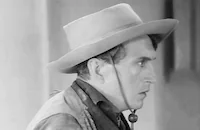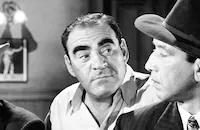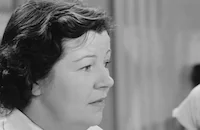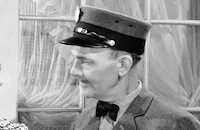Force of Evil

Brief Synopsis
Cast & Crew
Abraham Polonsky
John Garfield
Thomas Gomez
Marie Windsor
Howland Chamberlin
Roy Roberts
Film Details
Technical Specs

Synopsis
Joe Morse, an attorney for racketeer Ben Tucker, realizes that thousands of people select the number "776" in the lotteries on Independence day and conceives of a clever scheme to fix that as the winning number on the Fourth of July, thus bankrupting the numerous numbers banks operating in the city and enabling Tucker to gain a stranglehold on the racket. Joe is motivated by Tucker's promise to consolidate the new syndicate under his brother Leo's small-time numbers operation. Knowing that Leo, an intrinsically honest man in a dishonest business, will resist joining the syndicate, Joe goes to visit his brother on the eve of the Fourth at his numbers bank, hidden in a small apartment in the slums. Joe offers his brother a piece of the impending combine, but Leo denounces the proposed alliance with Tucker, then excoriates his brother's lack of principles and reminds him of the sacrifices that he has made to put him through law school. To save his brother from financial ruin, Joe arranges for Leo's bank to be raided that night, thus assuring that it will be closed the next day when 776 hits. After Joe leaves, Leo's young secretary, Doris Lowry, who witnessed Leo's barrage, tearfully informs her boss that her conscience will no longer allow her to work for him. Soon after, the police arrive and arrest everyone on the premises, including Doris, Leo and his meek bookkeeper, Freddy Bauer. Although Leo refuses Joe's help, Joe goes to the jailhouse and pays everyone's fines. When Leo announces that tomorrow will be his last day in business, Joe advises him to close immediately, but Leo insists on honoring his patron's bets. Feeling responsible for Doris' arrest, Leo asks Joe to escort her home, and along the way, they discuss issues of ambition and guilt. The next day, July 4th, all the numbers banks in the city are thrown into bankruptcy when the number 776 hits. Joe pays another visit to his brother, and now ruined, Leo reluctantly enters into an alliance with Tucker. Encountering Doris in the lobby of Leo's apartment building, Joe justifies his actions by assuring her that his brother really wanted to be forced into the combine. During the first day of reorganization, Tucker's men take control of Leo's operation, and Bauer, terrified, states his intention to quit, but Joe uses implied threats to convince him to stay on. In desperation, Bauer determines to drive Tucker out of business by informing Link Hall, the city's new special prosecutor, of the location of Leo's bank. Later, as Bauer is leaving the office, he is approached by Wally, an emissary from Tucker's business rival, Ficco, who asks him to arrange a meeting between Ficco and Leo. That evening, Joe finds Tucker's flirtatious wife Edna and Doris waiting to see him at his office. After Edna warns Joe that her husband's phone has been tapped, Joe, sensing the law closing in on him, checks his private line to Tucker. Troubled, Joe leaves the office with Doris and confides his fears and self-doubts to her. Following Bauer's tip, the police raid Leo's bank the next day, arresting Bauer, Leo and Doris once again. When Tucker vows war on Ficco, Joe, sensing trouble, asks Tucker to release Leo from the bank and promises to take his place, thus opening himself up to criminal charges. As they await arraignment, Doris, blaming Joe for her arrest, denounces him and warns that he will be responsible for Leo's death. Afterward, Leo refuses Joe's offer to buy him out and discovers that Bauer was his betrayer. That night, Joe returns to his office and finds an intruder there. After the man leaves, Joe extracts a wad of cash from his safe and flees the building. Leo, meanwhile, fearing for Bauer's safety, gives him a ride in his car. When the frightened Leo wanders off by himself, he is accosted by Wally and forced to set up a meeting with Leo. As soon as the unsuspecting Leo enters a café to meet Bauer, Ficco's men rush in, shoot Bauer and kidnap Leo, who then suffers a heart attack. Joe, meanwhile, has finally come to the realization that he has ruined his life. In a restaurant, as Joe drunkenly tells Doris his plans to run away, Doris fights for his salvation. When Joe spots the morning newspaper headlines trumpeting Leo's kidnapping, he runs out of the restaurant. Just as Ficco and Tucker reach an accord at Tucker's apartment, Joe pounds at the door and Tucker informs him that he has gone into business with Ficco. After Ficco coolly declares that Leo is dead and that his body has been dumped under a bridge, Joe, filled with vengeance, surreptiously picks up the receiver of Tucker's tapped phone. When Joe begins to recite a litany of Tucker's crimes for Hall to hear, Tucker realizes what is happening and attacks Joe, extinguishing the lights in the process. In the darkness, all three men nervously finger their pistols. After stalking Tucker, Joe kills him and then turns his gun on Ficco. Then, picking up the phone receiver, Joe declares that he is on his way to police headquarters. First, however, he goes with Doris to find Leo's body under the bridge. As they walk away, Joe voices his determination to join Hall in his battle to end corruption.

Director

Abraham Polonsky
Cast

John Garfield

Thomas Gomez

Marie Windsor
Howland Chamberlin

Roy Roberts

Paul Fix
Stanley Prager
Barry Kelley
Paul Mcvey
Beatrice Pearson
Jack Overman
Tim Ryan
Barbara Woodell
Raymond Largay

Beau Bridges
Allen Mathews
Georgia Backus
Sid Tomack
Jan Dennis
Paul Frees
Bert Hanlon
Bob Williams
Bill Neff
Frank Pharr
Joseph Warfield
Perry Ivans
Cliff Clark
Larry Blake
Phil Tully
Paul Newlan
Max Wagner
Chuck Hamilton
Capt. Fred Somers
Ray Hyke
George Magrill

Ralph Dunn
Jim Davies
Bob Reeves
Bud Wiser
Brick Sullivan
Carl Saxe
Jimmy Dundee
Mickey Mcguire
Bud Fine
Douglas Carter
Sam Ash
Milton Kibbee

Esther Somers
Mervin Williams
Frank O'connor
Charles Evans
Will Lee
David Mckim
William Challee
Joey Ray
David Fresco
Stanley Waxman
Eileen Coghlan
Barbara Stone
Estelle Etterre
Helen Eby-rock

Margaret Bert
Jesse Arnold
Betty Corner
Jim Toney
Sherry Hall
Shimen Ruskin
Jim Drum
Carl Sklover

John Butler
Forbes Murray
Dick Gordon
Roger Cole
Jay Eaton
Carl Hanson

Arthur O'connell
Bert Davidson
Ralph Brooks
Dick Elmore
Murray Alper
Robert Strong

Joel Fluellen
Mildred Boyd
Louise Saraydar
Ray Hirsch
Barbara Combs
John Collum
William H. O'brien
Bob Stebbins
Ann Duncan
John Indrisano
Diane Stewart
Ed Peil Sr.
Crew
Robert Aldrich
George Barnes
Jack Baur
Edward G. Boyle
Richard Day
Carl Gibson
Joseph C. Gilpin
Keneth Hopkins
Lillian Lashin
Gus Norin
Howard Lee Paul
Rudolph Polk
Abraham Polonsky
David Raksin
Bob Roberts
Arthur Seid
Walter Thompson
Jack Warren
Frank Webster
Don Weis
Scotty Welbourne
Louise Wilson
Ira Wolfert
George Yohalem

Photo Collections
Videos
Movie Clip



Hosted Intro
Film Details
Technical Specs

Articles
Force of Evil - John Garfield in FORCE OF EVIL, Quintessential Film Noir from 1948
In Body and Soul, Garfield portrays a boxer struggling to reclaim his soul after handing it over to a crooked promoter. In Force of Evil, he plays a lawyer who prospers by smoothing things out for a numbers racketeer, then tries to reverse course when he sees what harm his deal with the devil has done. The theme of integrity lost and recovered was an important one to Garfield and the members of the formative artistic influence in his life, The Group Theater collective of the 1930s. Its members agonized over whether film work in Hollywood was tantamount to selling out. There was another more immediately urgent issue. The House Un-American Committee was gearing up a witch hunt that took the form of rooting out supposed communists in the film industry. The point of honor among those called to testify was not whether they were members of the Communist Party or not (Garfield said he never was), but whether they were willing to do HUAC's bidding and name the names of others. Garfield refused. Robert Rossen, who directed Body and Soul, did. Garfield then hired Body and Soul screenplay writer Abraham Polonsky, to direct Force of Evil. Polonsky, blacklisted soon afterward, didn't direct again until 1969's Tell Them Willie Boy Is Here. But his mind was very much on his work in Force of Evil. More than a change of costume from trunks, gloves and a boxing ring to custom-made suits and a sleek office, it's even tighter and more electrifying than its predecessor, just as much a classic. Throughout, it crackles with something more than urgency. It's propelled by the energy of a story desperate to get itself told and if its elements are at times crudely tabloid, they also summon a gritty urban poetry that grabs and holds you.
The driving force in both is Garfield - rugged, broad-shouldered, sexily unruly, attacking his lines, attacking both characters with a passion and abandon that sweep you along with his tainted protagonists. Always you feel Garfield is taking his characters and their dilemmas personally, whether in the ring or in the rackets. He's not repeating anything in Force of Evil. He's regenerating it, the "it" being a battered idealism that in the end refuses to go down for the count. He's even more compelling the second time around - and he's no slouch the first. Never has a film's title been more accurate. Watching Garfield's Joe Morse realize this, and climb out from under his hubris to undo the grave harm he has done is a wrenching journey.
Although Force of Evil tells a tabloid story, it's elevated by the passion in the playing of it, and by the poetry in Polonsky's terse but sentient and at times even gutter-lyrical script. It's advanced no end by Thomas Gomez's richly textured and deeply felt performance as Joe's elder brother, Leo, content to run a small neighborhood numbers pad, a man who has no trouble with his occupation, and who cares about the people who work for him. He may not be an unblemished man, but he's an honorable man, far more than just a small-time version of Joe, looking down from the top. The conflict is brought to a head when the big boss, Ben Tucker (Roy Roberts), decides to wipe out the city's small independent operations like Leo's and take over all the numbers action by fixing a July 4th race so the pari-mutuel numbers 776 win. Because that number is widely played on July 4, most of the small operators are wiped out.
Joe assures Leo he'll be even better off working for Tucker, as Joe has arranged. But Leo, whose employees end up jailed and out of work, is disgusted by the way the mob works. Having a lower tolerance for corruption than his lawyer brother, Leo wants out entirely. Disheveled Leo, looking all the more simpatico for his rumpled look and unbuttoned vest over his paunch, is kidnapped, however, by a rival mobster. Additionally, Leo's milquetoast bookkeeper is murdered because he could have identified the kidnappers. Matters of escalate, punctuated by Beatrice Pearson's true-blue working girl trying to wean Joe away from the mob, and by noir diva Marie Windsor, as the mobster's bored wife, coming on to Joe, oozing suggestiveness. Bent as his moral compass may be, however, he knows she's trouble. But not until the violence to Leo does Joe belatedly awaken to the fact that evil eats those who cozy up to it. The film builds to a jackhammer climax, preceded by a brilliant coup de cinema when Joe and Pearson's good girl in a series of long and medium shots go down, down, down, from the Washington Bridge, zigzagging their way through a descent on stone steps to the rocks at the Hudson River, where Joe finds Leo dead. In a last-round KO, Joe draws the killers and the crooks to his office for a showdown, prepared to pay the moral bill he has run up. The film's title, like the film itself, remains balefully pertinent, especially the part about the mergers and acquisitions that grow crime, and by extension, large organizations throwing their weight around to devour smaller ones. The forfeit of Joe's law career is an ironic, if pale, stand-in for the life of the dynamic Garfield himself, whose scarlet fever-weakened heart cannot but have been stressed unduly by his HUAC grilling. He died in 1952, aged 39. One can only imagine what he might have gone on to had he had the chance.
For more information about Force of Evil, visit Olive Films. To order Force of Evil, go to TCM Shopping.
by Jay Carr

Force of Evil - John Garfield in FORCE OF EVIL, Quintessential Film Noir from 1948
Force of Evil
In a role that typified the harsh, cynical edge he could bring to his pictures, Garfield is a powerful, selfish Wall Street lawyer who grew up on the streets (like Garfield himself, a product of Bronx street gangs) but has risen to a place of undeniable importance.
But that rise has been as underhanded as that of a classic Pre-Code gold digger sleeping her way up the corporate ladder. Garfield's "office in the clouds" was bought through allegiance to a criminal mob who use him as their brains in a scheme to gain control of the city's smalltime illegal gambling trade. Fixing the July 4th gambling racket so that the popular bet of "776" comes up the winner, Joe and mob boss racketeer Ben Tucker (Roy Roberts) plan to drive all of the small time numbers racketeers out of business when they are unable to pay out the winning bets.
Director Abraham Polonsky makes a bitter comparison between the money-oriented corruption practiced by lawyers like Joe with the more explicit graft of mobsters like Tucker. Both refer to the men not included in their scam as "suckers." And that casual dismissal of ordinary people is also seen in the film's opening overhead shot of pedestrians whose ant-like scurrying down on the street below only reaffirms Joe's God-like roost.
Joe's one attempt to reach out to the "little man" backfires and ends up jeopardizing the entire criminal plan. Joe's older brother Leo (Thomas Gomez), who¿ in ill health, operates a small time racket out of a miniscule office, and Joe is determined to bring him into Tucker's scheme before his office is wiped out with the rest of the small-change money-rackets. But Leo will have nothing to do with the scheme. A line is drawn in the sand, with both brothers engaged in a battle that soon has disastrous and bloody consequences.
Also drawn into the turmoil is Leo's pretty, naive secretary Doris Lowry (Beatrice Pearson). Joe is drawn to her innocence despite being involved in a sordid relationship with Tucker's wife Edna, played by one of the classic film noir femme fatales - Marie Windsor (The Killing 1956, The Narrow Margin, 1952), whose performance in the film was highly praised.
Force of Evil was Polonsky's first directing effort after a successful screenwriting debut with the hit film Body and Soul (1947). Polonsky wrote the script for Force of Evil, along with Ira Wolfert who also wrote the novel, Tucker's People, that the film was based on. Their first draft of the screenplay was deemed so harsh that the censorial Breen office demanded a rewrite. Though it received mixed reviews upon its original release, the movie has since become highly regarded; noted critic Andrew Sarris called it, "one of the great films of the modern American cinema."
Polonsky had a remarkable vision both pictorial and thematic that he brought to the screen in Force of Evil. The film's punchy, stylized visuals and pessimistic tone have made it into a film noir classic. Unfortunately, Polonsky was never allowed to flourish as a director.
It is unfortunate that Polonsky, a member of the Communist Party, fell out of favor in the industry after he was deemed an uncooperative witness during the HUAC trials in 1951 and blacklisted from working in Hollywood. Though Polonsky went on to write TV scripts under an assumed name and eventually returned to movie work in the late Sixties with such notable efforts as Tell Them Willie Boy Is Here (1969) and Romance of a Horsethief (1971), the blacklisting significantly jeopardized his career arc.
Garfield was also branded an "uncooperative" during the HUAC trials, suspected of being a Communist or supportive of Communist causes along with actors such as Edward G. Robinson, Paul Muni, Sylvia Sidney and Melvyn Douglas. Garfield's career was not destroyed as some were by the HUAC trials, but he did turn to the stage as a momentary sabbatical from film work. Garfield was initially discussed for the lead as Stanley Kowalski in Elia Kazan's Broadway direction of Tennessee Williams' A Streetcar Named Desire. But Garfield's insistence on also starring in the film and his desire for a short-term theater run led to a negotiating deadlock. The role eventually went to a little-known actor named Marlon Brando.
Director: Abraham Polonsky
Producer: Bob Roberts
Screenplay: Abraham Polonsky and Ira Wolfert based on his novel, Tucker's People
Cinematography: George Barnes
Production Design: Richard Day
Music: David Raksin
Cast: John Garfield (Joe Morse), Beatrice Pearson (Doris Lowry), Thomas Gomez (Leo Morse), Howland Chamberlain (Freddy Bauer), Roy Roberts (Ben Tucker), Marie Windsor (Edna Tucker).
BW-79m. Closed captioning.
by Felicia Feaster
Force of Evil
Quotes
All that Cain did to Abel was to murder him".- Leo Morse
What do you mean "gangsters"? It's business.- Wally
Trivia
In order to show cinematographer George Barnes how he wanted the film to look, Polonsky gave him a book of Edward Hopper's Third Avenue paintings.
This film was selected to the National Film Registry, Library of Congress, in 1994.
Notes
The working titles of this film were Tucker's People, The Story of Tucker's People and The Numbers Racket. According to an August 1948 Daily Variety news item, the PCA objected to the word "racket" in the title and so ruled out the use of The Numbers Racket. The film opens with the offscreen voice of "Joe Morse" speaking over an image of Wall Street. Joe says, "tomorrow, July 4th, I intended to make my first million dollars...temporarily, the enterprise was slighty illegal, you see I was the lawyer for the numbers racket...The suckers bet on any combination of three numbers. Twenty million bettors a day in the United States, an annual income of over $100,000,000...it seemed a shame so much good money to go to waste in other people's pockets..."
The Variety review and CBCS incorrectly list Sheldon Leonard as "Ficco." According to a June 1948 news item in the Los Angeles Daily News, Dorothy Comingore was slated to appear in the film. A June 1948 New York Times news item notes that two climactic sequences were to be shot on location in New York City. An October 1948 Hollywood Reporter news item adds that director Abraham Polonsky and producer Bob Roberts were assembling and editing an alternate beginning to the film to be tested at a series of previews. It has not been determined if the alternate opening was used in the released print, however. According to materials contained in the PCA files in the AMPAS Library, PCA director Joseph I. Breen objected to "the completely anti-social basic theme of this story, which presents wrong as right and right as wrong, in violation of both the letter and spirit of the Production Code." The Variety review criticized the film because its "poetic, almost allegorical interpretation keeps intruding on the tougher elements of the plot." The Hollywood Reporter review complained that the direction was "more concerned with plugging the verbose dialogue than in achieving action and dramatic values." Modern critics now praise the film for those same qualities.
According to a 1953 Daily Variety news item, Bank of America foreclosed on Enterprise Productions, Inc., claiming that the company owed them an unpaid sum of $208,000 for the financing of the film and were also in arrears for Body and Soul. For more information about that suit, please see the entry above for Body and Soul.
Force of Evil marked the screen debut of Beatrice Pearson, and also marked the directorial debut of screenwriter Abraham Polonsky. According to modern sources, Polonsky went to Europe to write a novel after completing the film. Upon returning to Hollywood in 1950, he concluded a deal with Twentieth Century-Fox to direct his next project. In April 1951, however, Polonksy was subpoenaed to appear before the House Committee on Un-American Activities, and after refusing to affirm or deny membership in the Communist party, he was blacklisted. During the period of the blacklist, Polonsky worked as an uncredited writer for both films and television. In 1968, he received screenplay credit for Madigan, the first time his name appeared onscreen since being blacklisted. Polonsky did not direct another picture until the 1969 film Tell Them Willie Boy Is Here.

Miscellaneous Notes
Released in United States 1997
Released in United States December 26, 1948
Released in United States February 1996
Released in United States Winter January 1, 1948
Shown at MoMA (The Martin Scorsese Collection) in New York City February 22-27, 1996.
Shown at Vancouver International Film Festival (Polonsky Tribute) September 26 - October 12, 1997.
Formerly distributed by MGM.
Completed shooting August 10, 1948.
Released in United States 1997 (Shown at Vancouver International Film Festival (Polonsky Tribute) September 26 - October 12, 1997.)
Released in United States Winter January 1, 1948
Released in United States December 26, 1948
Selected in 1994 for inclusion in the Library of Congress' National Film Registry.
Released in United States February 1996 (Shown at MoMA (The Martin Scorsese Collection) in New York City February 22-27, 1996.)














